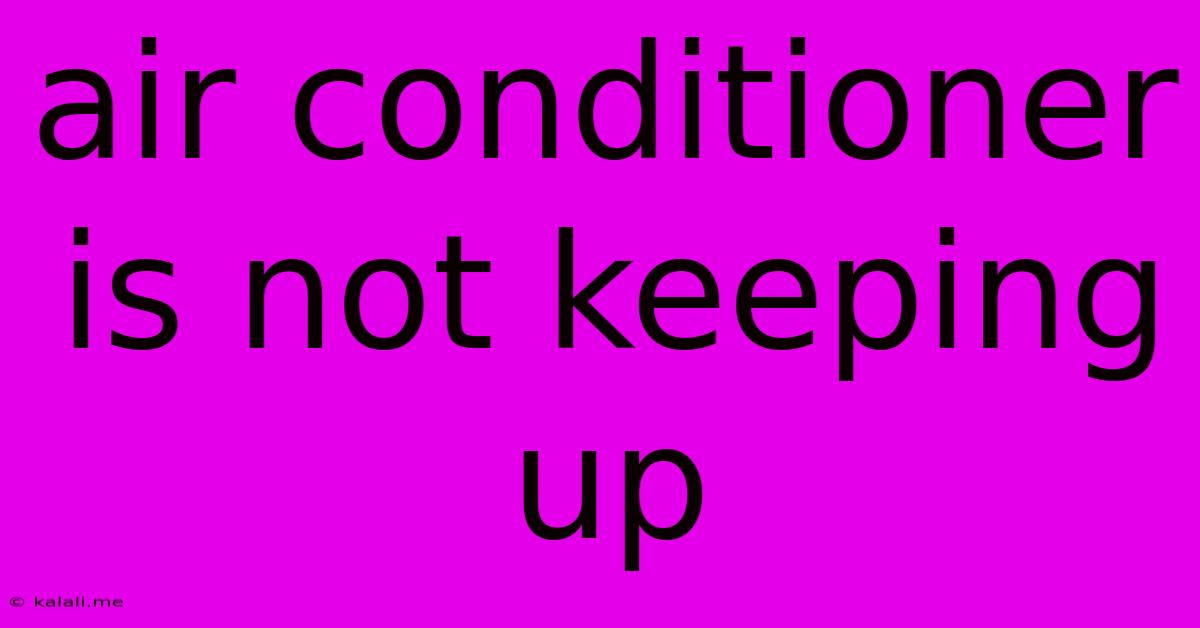Air Conditioner Is Not Keeping Up
Kalali
Jun 08, 2025 · 3 min read

Table of Contents
Air Conditioner Not Keeping Up? Troubleshooting Your Cooling System
Is your air conditioner struggling to keep your home cool? A malfunctioning AC unit can be incredibly frustrating, especially during a heatwave. This article will guide you through common reasons why your AC might not be keeping up and offer troubleshooting steps to help you restore that refreshing chill. Knowing the underlying cause will help you determine if it's a simple fix or requires professional help.
Common Reasons Your AC Isn't Keeping Up
Several factors can contribute to an underperforming air conditioner. Let's explore the most frequent culprits:
-
Dirty Air Filter: This is the most common and easiest fix. A clogged air filter restricts airflow, forcing your AC to work harder and potentially leading to reduced cooling capacity. Replacing a dirty filter is a simple DIY task and can significantly improve your AC's performance.
-
Refrigerant Leaks: Refrigerant is the substance that absorbs heat within your AC unit. Leaks can cause a significant decrease in cooling power, leading to ineffective cooling. Detecting refrigerant leaks requires specialized tools and should be handled by a qualified HVAC technician.
-
Frozen Evaporator Coil: A frozen evaporator coil restricts airflow and significantly impacts cooling. This can be caused by restricted airflow (dirty filter, blocked vents), low refrigerant levels, or a malfunctioning defrost cycle.
-
Dirty Condenser Coils: Similar to a clogged air filter, dirty condenser coils impede heat dissipation, reducing the efficiency of your AC unit. Cleaning the condenser coils, ideally with a coil cleaner, improves airflow and helps your AC run more efficiently.
-
Faulty Blower Motor: The blower motor circulates cool air throughout your home. A failing blower motor may not circulate air effectively, resulting in poor cooling. This requires professional diagnosis and repair.
-
Improper Thermostat Settings: Incorrectly set thermostats can cause your AC to underperform. Ensure your thermostat is set to "cool," the temperature is appropriately low for your desired comfort level, and that the fan setting is correctly adjusted.
-
Insufficient Insulation: Poorly insulated homes lose cooled air more quickly, forcing your AC unit to work harder to maintain the desired temperature. Consider improving your home's insulation to enhance energy efficiency and improve AC performance.
Troubleshooting Steps: A Step-by-Step Guide
Before calling a professional, try these simple troubleshooting steps:
-
Check the Air Filter: This is the first thing you should always check. A dirty filter is a major culprit in reduced cooling capacity. Replace it with a new one of the correct size and type.
-
Clean the Condenser Coils: Carefully clean the condenser coils located outside your home. Use a coil cleaning brush or a garden hose to remove dirt and debris. Be careful not to damage the fins.
-
Inspect Vents and Registers: Ensure that all vents and registers are open and not obstructed. Blocked vents restrict airflow and reduce cooling efficiency.
-
Check the Thermostat: Verify that the thermostat is properly set, the batteries are fresh, and it's correctly calibrated.
-
Listen for Unusual Noises: Unusual noises, such as grinding or rattling, could indicate a mechanical issue requiring professional attention.
-
Observe the Airflow: Feel the air coming from the vents. Weak airflow suggests a problem with the blower motor or restricted airflow somewhere in the system.
When to Call an HVAC Technician
While many issues can be addressed with simple DIY fixes, some problems require the expertise of a qualified HVAC technician. Call a professional if:
- You suspect a refrigerant leak.
- The evaporator coil is frozen.
- The blower motor is malfunctioning.
- You hear unusual noises from your AC unit.
- You've tried basic troubleshooting steps, and the problem persists.
Regular maintenance, including annual inspections and cleaning, is crucial for optimal AC performance and longevity. By understanding the common causes of cooling problems and following these troubleshooting tips, you can keep your home cool and comfortable throughout the summer months.
Latest Posts
Latest Posts
-
How Much Mileage Should I Get Out Of Hiking Shoes
Jun 08, 2025
-
How To Breed Dogs On Minecraft
Jun 08, 2025
-
Take It For Granted In Spanish
Jun 08, 2025
-
I Ll Make It Up To You In Spanish
Jun 08, 2025
-
Expansion Tank For Hot Water Heater
Jun 08, 2025
Related Post
Thank you for visiting our website which covers about Air Conditioner Is Not Keeping Up . We hope the information provided has been useful to you. Feel free to contact us if you have any questions or need further assistance. See you next time and don't miss to bookmark.